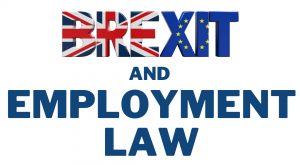What do employers and employees need to know?
The UK/EU withdrawal agreement took effect on 31 January 2020, followed by a transition period which ended on 31 December 2020.
During the transition, most EU law still applied to the UK, but substantial change is predicted when the transition ends, whatever is agreed (or not agreed) by that time.
Employers and employees should consider how employment law is affected, what action they need to take now, and how the law might change in future.
On the whole, the impact on employment law is going to be relatively small compared with other areas of law. Much of our employment law came from the EU, (although there were protections about some of the following before EU laws) including discrimination rights, collective consultation rules, family leave, working time regulations, TUPE and agency worker duties. It appears most of it will remain the same after Brexit.
The end of Freedom of Movement
Strictly speaking, this is immigration law, not employment law, but crucial for employers in terms of action they should take as a priority.
On 31 December 2020, the free movement of EU nationals to the UK and UK nationals to the EU ended. From 1 January 2021, freedom of movement rights will come to an end and will be replaced with a points-based immigration system.
EU citizens travelling to the UK for work, after 1 January 2021, will require permission under the points-based system prior to entering the UK. Visas will be issued to people who gain enough points for a job offer at the appropriate skill level, if they speak English to the required level and if they meet a salary threshold.
EU Settlement Scheme – how your EU employees can protect their right to remain in the UK
Businesses that employ EU citizens who have lived in the UK before 1 January 2021 should direct their employees to make an application under the EU Settlement Scheme which will enable them to continue lawfully residing and working in the UK after the deadline for applying for the scheme ends on 30 June 2021.
Employees that have lived in the UK for 5 years can apply for Settled Status. If their application is successful, they will have the right to reside and work in the UK indefinitely.
For EU citizens, who have resided in the UK for less than five years, they may apply for Pre-Settled Status until they have met the five years’ continuous residence to obtain Settled Status.
EU employees will need to apply under the scheme by 30 June 2021. If they have not, they risk falling into the status of living in the UK unlawfully affecting their rights to rent, to employment, to benefits and healthcare.
Irish citizens will not need to apply to continue their residency rights in the UK because their right to live and work is guaranteed under pre-existing arrangements. However, EU and Non-EU family members of Irish citizens will need to apply for status under the scheme.
Hiring EU citizens from 01 January 2021 – obtaining a sponsor licence
As mentioned above, Europeans coming to work in the UK from 01 January 2021 will require work authorisation from an approved employer. Where employers wish to recruit EU citizens from 1 January 2021, they will need to have applied for and been granted a sponsor licence. The sponsor licence can also be used to hire non-EU citizens. Employers planning to hire EU citizens based overseas should take steps now to apply for a sponsor licence to minimise any potential disruption with future recruitment plans.
UK farms rely heavily on seasonal labour from EU workers. The government has therefore agreed to extend an existing pilot scheme for seasonal workers which will increase the number of visas available from 10,000 in 2020 to up to 30,000 in 2021.
Right to work checks
UK employers must ensure that their employees have the right to the work (RTW) in the UK before they start work and throughout their employment. A valid RTW check will protect employers from liabilities for civil penalties or even criminal prosecution, in the event they are found to be employing someone without the RTW in the UK. The Home Office’s guidance indicates that during a grace period to 30 June 2021, employers can continue to solely check an EU citizen’s passport or national ID card in the same way as usual.
Retrospective RTW checks are not required for employees whose work commences on or before 30 June 2021.
Employers can rely on such employees’ EU passports or ID cards to carry out RTW checks. However, for EU citizens arriving for the first time from 1st January 2021, they will not have a valid RTW, unless they hold a work visa. This appears to contradict the grace period guidance confirming that until 30th June 2021, an EU passport or ID card is sufficient for RTW check purposes.
The conflict in the RTW grace period policy carries a risk that some people may be employed without the relevant work permission which could expose the employer to sanctions. Further guidance from Government is expected and will be welcomed to provide clarity on this area of concern.
Employment Bill
Initially it was thought that workers’ rights derived from the EU would be protected by a “non-regression” statement, but that was not ultimately included in the EU Withdrawal Agreement and instead, the Government has said there will be a new Employment Bill to both protect and enhance workers’ rights, but the content remains to be seen.
Below are the key areas of employment law, and how they might be affected after the end of the transition period:
1. Discrimination
Employment discrimination laws are contained in the Equality Act 2010. Because this is primary legislation, it will remain after transition unless the government were to repeal it (unlikely). In theory, after Brexit the government could alter it (by adding to protections OR taking them away), without being constrained by EU law (subject to passing through parliament in the usual way).
2. Family and Parental Rights
These are a mixture of EU and domestic derived rights, including the right to request flexible working, and shared parental leave. There is nothing to indicate these rights will change.
3. TUPE
There is a suggestion the TUPE regulations (which deal with the transfer of businesses, and outsourcing arrangements) could eventually be changed in minor ways that are not permitted right now under EU law, to make them more business-friendly.
4. Holiday Pay
The current rights are courtesy of the Working Time Regulations 1998. These regulations are not primary legislation, so in theory, could be amended after the transition period to reduce workers’ rights that have historically arisen in ECJ case law.
5. Working Time
The cap on maximum weekly hours is set out in the Working Time Regulations 1998 (subject to rights to opt-out of the cap). In theory, this cap could be removed, and rights to breaks reduced.
6. Collective Redundancy
These rules only apply where 100 or more employees are proposed to be dismissed and are not thought to be very burdensome. They are unlikely to be a priority for change.
7. Agency Workers
These laws are not popular with businesses due to their complexity so they may well be a priority for revocation. On the other hand, after a recent review, the government had assisted agency workers to achieve pay parity, so its policy may not be to revoke these regulations.
8. Human Rights
The ECHR (European Convention on Human Rights) lays down the minimum standards for the protection of human rights in countries belonging to the Council of Europe. It was largely incorporated into domestic law by the Human Rights Act 1998 and Brexit does not affect it.
9. Professional Qualifications
Expect changes to the provisions about recognition of equivalent qualifications from other EU countries if you employ professionally qualified staff from the EU.
Further Assistance
ACAS has useful guidance for employers about Brexit as follows:
- Checking if someone has the right to work in the UK
- Applying for settled status
- Advice on employment rights
https://www.acas.org.uk/employment-rights-after-brexit
The Government guide to workplace rights from 1st January 2021 is available here
The Government’s “Brexit Checker” questionnaire/guide is here







